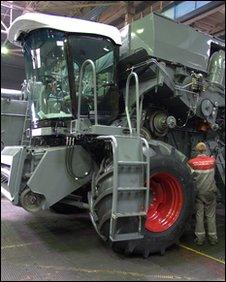Russian business hopes for visa reform
- Published

Rostov-on-Don is home to a huge producer of combine harvesters
When EU leaders touch down in the southern Russian city of Rostov-on-Don ahead of next week's EU-Russia summit, their immigration experience is likely to be markedly different from that of the average traveller.
Upon arrival at the functional, white stone international terminal in this South Russian city, visitors are greeted with signs saying "welcome to Rostov-on-Don" in Russian and English. However, if you're not Russian, you're also likely to face lengthy queues to have your visa inspected.
In order to get a visa, you have to go through a time-consuming procedure involving getting an official invitation and possibly handing in a bank statement to prove that you have got enough funds to cover your trip.
Most importantly, this all needs to be set in motion well before the planned travel date.
It is a system so intricate that it sometimes leaves even those who make a living out of it stranded.
It's no wonder that private companies in Rostov-on-Don hope next week's summit will make progress on freeing up the visa system.
Talks frustrated
The Mauer Group is an auditing and consulting company in Rostov. They advise foreign investors on issues ranging from customs and taxation to immigration.
The Don is one of the major rivers of Russia
A few days before we visited, one of its partners from Austria wanted to fly to an important meeting here, at relatively short notice. He had hoped to get an express visa but was told he had to wait 30 days instead - so the negotiations had to be cancelled.
Alexey Miroshnikov, head of the company's international co-operation department, says getting work permits for foreigners is even more difficult than obtaining a visa.
It's a problem that cuts both ways.
"I know Russian businessmen who put off investing abroad because they could not be sure that they would be able to get to their new business relatively easily," says Mr Miroshnikov.
'Symbolic' move
The Mauer Group's office in central Rostov is not far from the Hotel Don Plaza, a modernist high-rise where the EU and Russian leaders are meeting from 31 May to 1 June.
EU-Russian relations have not been easy in recent years, but now it seems both sides are ready to move on.
There's hope that the summit may produce agreement on a road map towards visa liberalisation - a matter that was first raised by then Russian President Vladimir Putin in 2002.
"It would be incredibly symbolic if both sides said that they want to move towards visa-free travel," says Andrew Cranston, senior partner at the audit company KPMG Russia in Moscow, which also has an office in Rostov-on-Don.
"When it comes to improving the investment climate in Russia, most companies list three main concerns: bureaucracy, corruption in parts of the economy - and the ability to move people around."
A better investment climate will be crucial if Russia wants to attract more European companies as part of its drive to diversify the economy.
Fair competition
Oleg Landin, marketing director of Rostselmash, Russia's biggest producer of combine harvesters, says that his company is already working with European companies and suppliers.
Founded some 80 years ago, Rostselmash, spread over 800,000 square metres, is so huge that the locals call it a city within the city.
Its harvesting machines were used across the Soviet Union, but the past few years have been tough.
Since the end of the Soviet Union, production has fallen from 80,000 a year to 6,000-7,000 and the number of workers has dropped from 120,000 to 12,000.
In 2000, the state sold the company to a private holding in Moscow.
During the recent financial crisis demand for agricultural machines fell sharply and the company had to lower its prices.
If there is one thing Mr Landin would wish for from the politicians, it is equality for producers.
"We are ready to compete with any producer from any country," he says.
Mr Landin claims that some European countries supported customers with special funds if they bought EU-made equipment during the financial crisis.
But Rostselmash itself received help from the Russian state at the height of the crisis in 2009, when the government gave 25bn roubles ($808m, 拢558m) to Rosagroleasing, a state company that leases out agricultural equipment, and slapped heavy import tariffs on agricultural equipment from outside Russia - at the expense of foreign competitors.
So there are still many issues to solve on the way towards any closer economic partnership between Europe and Russia.
"Modernising Russia's economy is a long journey," says KPMG's Andrew Cranston.
"And you have to look at it as a journey."
For more about business in Rostov-on-Don and the Russian economy watch Russia Business Report on 麻豆官网首页入口 World News this weekend: on Saturday, 29 May at 0430 GMT and 1730 GMT and on Sunday, 30 May at 1030 GMT and 2330 GMT.